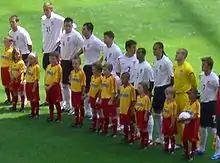Golden Generation (English football)
The players of the England national football team in the 2000s have been referred to as a golden generation. Despite the talent of its players and their success at club level, the Golden Generation has been known as underachievers, being eliminated at the quarter-finals in three major tournaments and failing to qualify for UEFA Euro 2008.[1]

The term "Golden Generation" was coined by The Football Association chief executive Adam Crozier, and criticised as a burden by players such as Frank Lampard.[2] Reasons offered by pundits and players for the failure of the team have included arrogance,[3][4] tactical inflexibility,[5] the incapability of Lampard and Steven Gerrard to perform together in midfield,[5] and the lack of an assertive manager.[6]
History
England were eliminated from the 2006 FIFA World Cup by Portugal, in what Reuters referred to as a clash between two golden generations.[7] After the elimination, The Guardian columnist Paul Wilson blamed the defeat on what he perceived to be arrogance from the players.[3] Manager Sven-Göran Eriksson blamed the players' poor performance rather than the Portuguese quality,[8] which Wilson also considered arrogant.[3]
England failed to qualify for UEFA Euro 2008, a first qualification failure since the 1994 FIFA World Cup. Upon sacking manager Steve McClaren, Football Association board member Brian Mawhinney said "I've been brought up over the last few years believing that this was the golden generation, but I have to tell you, if this is the golden generation, the sooner we move away from the gold standard the better".[1] BBC Sport writer Phil McNulty wrote that McClaren had been Eriksson's assistant and was therefore unfit to revitalise the team.[9]
With many of the same players as in 2006, England entered the 2010 FIFA World Cup with media optimism that the Golden Generation would succeed.[10][11] Richard Williams of The Guardian called the last-16 elimination by Germany the "passing" of the Golden Generation that he believed had been born at the 1998 FIFA World Cup; many key players were retired from international football or past the age of 30. He contrasted the perceived "entitlement" of the players to the team that had won the 1966 FIFA World Cup.[4]
Frank Lampard said in 2009 that the "Golden Generation" tag was a burden placed on the players by former FA chief executive Adam Crozier.[2] Michael Owen said in 2021 that tactics were the downfall of the team: he said that the team should have played a 3–5–2 and not 4–4–2 formation due to a strength in central defence and central midfield.[5] Lampard and Steven Gerrard were criticised as midfield partners,[5] while the team was known for a wealth of central defenders including John Terry, Rio Ferdinand, Sol Campbell, Jamie Carragher, Ledley King and Jonathan Woodgate.[12] Gerrard said in 2020 that the team failed because managers were incapable of getting the best out of the team, offering Rafael Benítez as a hypothetical alternative.[6]
The England team of manager Gareth Southgate, which reached the semi-finals of the 2018 FIFA World Cup and the final of UEFA Euro 2020 has been contrasted positively with the 2000s team.[13] Eriksson referred to Southgate's team as a "second Golden Generation".[14] In the 2020s, the 2000s Golden Generation such as Lampard and Gerrard have been criticised as performing poorly in their subsequent managerial careers.[15][16]
References
- "England's 'golden generation' shows feet of clay". The New York Times. 23 November 2007. Retrieved 23 October 2023.
- Fifield, Dominic (12 October 2009). "Frank Lampard: Golden generation tag has been a burden". The Guardian. Retrieved 23 October 2023.
- Wilson, Paul (9 July 2006). "England's golden generation are just big heads". The Guardian. Retrieved 23 October 2023.
- Williams, Richard (27 June 2010). "World Cup 2010: Golden generation passes on after 12 frustrating years". The Guardian. Retrieved 23 October 2023.
- Cole, Jackson (18 March 2021). "Michael Owen believes tactics in England's Golden Generation featuring Gerrard and Lampard 'killed' them but backs Euro 2020 squad to fare better". Talksport. Retrieved 23 October 2023.
- Fordham, Josh (22 July 2020). "'We needed a manager who was bigger than the players' – Steven Gerrard blames England 'golden generation' failings on FA appointments". Talksport. Retrieved 23 October 2023.
- "Golden era to end in England-Portugal clash". Times of Malta. Reuters. 30 June 2006. Retrieved 23 October 2023.
- "Sven blames players for England exit". Australian Broadcasting Corporation. Agence France-Presse. 2 July 2006. Retrieved 23 October 2023.
- McNulty, Phil (22 November 2007). "Where it went wrong for McClaren". BBC Sport. Retrieved 23 October 2023.
- Molinaro, John F. (13 November 2009). "All Hail Fabio Capello". CBC Sports. Retrieved 23 October 2023.
Indeed, many critics believed that this golden generation of players would wrap themselves in glory in Germany and end the country's lengthy World Cup drought — England has won the World Cup once, in 1966.
- "England: Capello dares to dream". Times of Malta. 12 June 2010. Retrieved 23 October 2023.
- Brewin, John (30 May 2014). "Traditional centre-back a dying breed". ESPN. Retrieved 23 October 2023.
- Fordham, Josh (8 September 2021). "England's Golden Generation 'would have won something' with manager like Gareth Southgate in charge after failures under Sven Goran-Eriksson and Fabio Capello". Talksport. Retrieved 23 October 2023.
- "Gareth Southgate's England can be new golden generation, says Sven-Goran Eriksson". Sky Sports. 30 August 2018. Retrieved 23 October 2023.
- Liew, Jonathan (26 October 2022). "Why have so many of England's golden generation failed as football managers?". New Statesman. Retrieved 23 October 2023.
- Evans, Tony (18 January 2021). "What Wayne Rooney can learn from the England Golden Generation's failings". The Independent. Retrieved 23 October 2023.